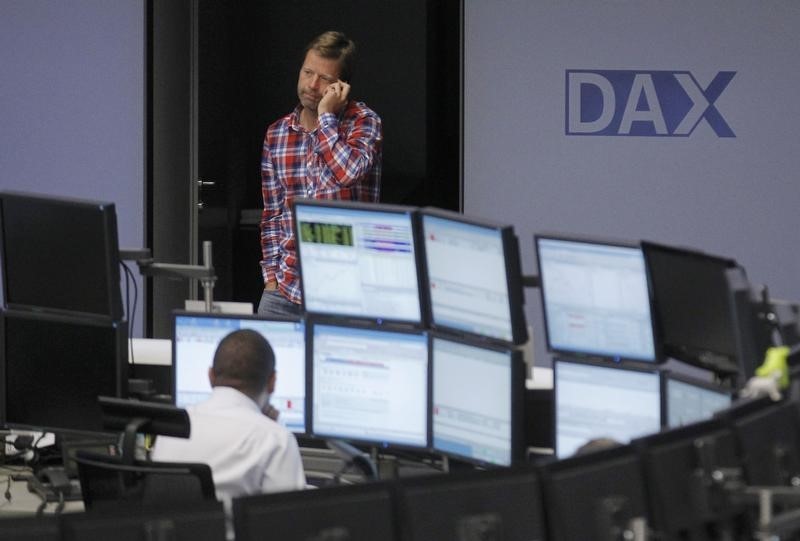* Europe shares hit two-week low, Asia biggest fall since Dec 15
* Wall Street seen opening lower, VIX tops 13 percent
* Copper drops 0.7 percent, safe-haven gold hits three-week high
* Yields drop as investors seek lowest-risk government debt
* Graphic: World FX rates in 2017 http://tmsnrt.rs/2egbfVh
By Nigel Stephenson
LONDON, March 22 (Reuters) - Shares fell on Wednesday, driving investors to the safety of government debt, gold and the yen, as doubts grew that U.S. President Donald Trump can deliver on a promise of tax cuts that had powered stocks markets to record highs.
Wall Street was expected to open slightly lower, index futures showed ESc1 SPc1 1YMc1 , and the CBOE's VIX index .VIX , known as the "fear gauge", briefly topped 13 percent for the first time since mid-January.
European shares hit two-week lows and Asian equities suffered their biggest one-day fall since Dec. 15. After sharp falls on Tuesday, MSCI's world stocks index .MIWD00000PUS fell half a percent for its biggest two-day drop since the same date.
The dollar touched a four-month low against the Japanese currency, whose strength helped push Tokyo stocks to a three-week low, while the euro held close to its highest since early February at around $1.08.
Investors' flight to safety pushed down U.S. Treasury yields and the gap between U.S. and German 10-year government borrowing costs hit its narrowest since November.
Waning risk appetite also hit commodities: Brent crude oil LCOc1 fell more than 70 cents to as low as $50.05 a barrel, its cheapest since Nov. 30. Copper CMCU3 fell 0.7 percent to $5.736 a tonne.
The main factor behind the sell-off in risky assets was doubt that Trump would be able to deliver on his agenda for economic growth, including tax cuts and relaxed regulation, any time soon.
In the first major legislative battle of his presidency, Trump is trying to rally Republican lawmakers behind a plan to dismantle Obamacare, and investors worry failure could spell trouble for the promised tax cuts and regulatory changes Generale currency strategist Alvin Tan, in London, said an FBI investigation into possible ties between Trump's campaign and Russia was also adding to investor worries.
"All in all, that's adding to a picture that the much hoped-for and hyped fiscal stimulus package may not be coming as soon as markets would like it to come, if at all," he said.
The pan-European STOXX 600 index .STOXX was last down 0.6 percent, having earlier dropped as much as 0.9 percent, led lower by banks .SX7P and miners .SXPP . Britain's FTSE 100 index .FTSE fell 0.8 percent.
MSCI's broadest index of Asia-Pacific shares outside Japan .MIAPJ0000PUS fell 1.4 percent at one point. In the previous session, the index hit its highest level since June 2015.
Japanese stocks .N225 fell 2 percent, Australian shares .AXJO tumbled 1.6 percent and mainland Chinese shares closed down 0.5 percent. MSCI's main measure of emerging market equities .MSCIEF slid nearly 1 percent.
The dollar, which has risen this year in anticipation of a boost from Trump's tax reform, edged up 0.1 percent against a basket of currencies .DXY .
However, the greenback was down 0.3 percent at 111.32 yen JPY= , having earlier hit a four-month low of 111.12 yen.
The euro EURO= dipped 0.2 percent to $1.0790, off a high of $1.0818 as European trading began. Sterling GBP=D3 fell 0.2 percent to $1.2450, having earlier hit $1.2507, its strongest in nearly four weeks.
TREASURY YIELDS
U.S. Treasury yields, which fell on Tuesday along with Wall Street, dropped further. The 10-year benchmark yield US10YT=RR dipped below 2.4 percent for the first time since March 1. It last stood at 2.41 percent, down 2.2 basis points on the day.
In early trade, the closely watched gap between U.S. and German 10-year yields touched its narrowest since November at around 195 basis points. German 10-year yields DE10YT=RR , the benchmark for euro zone borrowing costs, then fell further and were last down 3.8 basis points at 0.42 percent.
"Market participants are worried about the effects and feasibility of Donald Trump's growth programme," DZ Bank strategist Birgit Figge said.
"Alongside this, speculation is persisting ... that the ECB may possibly scale back its ultra-expansionary policy stance to some extent at an earlier point in time than is currently being assumed."
Gold hit a three-week peak of $1,248.47 and last traded up 0.2 percent at $1,247 an ounce. It has rallied almost $50 from last Wednesday's low after a less hawkish policy statement than many investors had expected from the U.S. Federal Reserve.
For Reuters Live Markets blog on European and UK stock markets see reuters://realtime/verb=Open/url=http://emea1.apps.cp.extranet.thomsonreuters.biz/cms/?pageId=livemarkets
